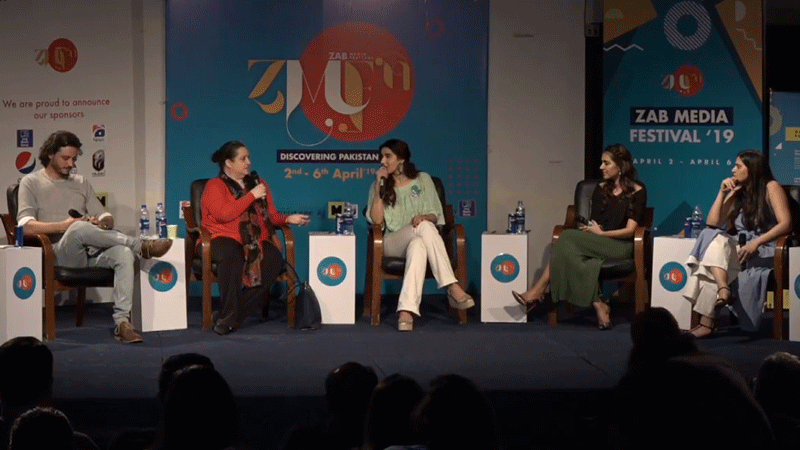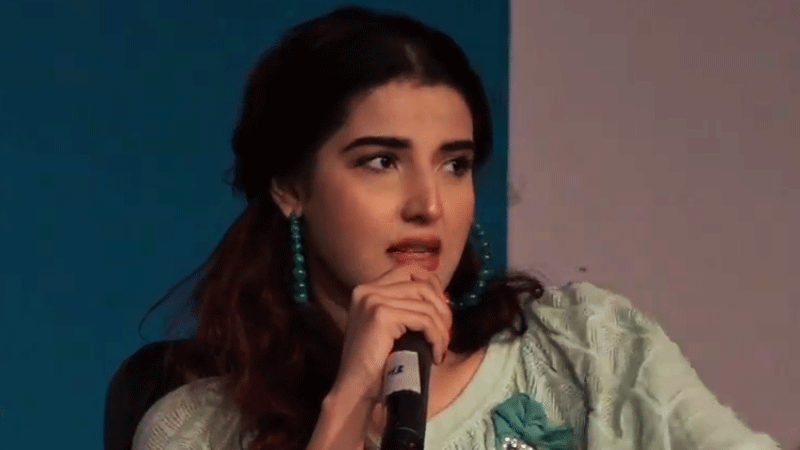Did you catch the ZAB Media Festival's live session this weekend on film and TV with actors Mansha Pasha, Hareem Farooq, Osman Khalid Butt and journalist Fifi Haroon on the panel?
If you didn't, let us brief you on a couple of important things that they spoke about.
The hour-long session moderated by journalist Manal Faheem Khan focused primarily on the representation of women in mainstream media. Although the conversation drifted a few times - there was talk on sexual harassment, excluding women from public spaces, among other things - the panelists all shared interesting thoughts on women's representation in the media.
Here are four takeaways from the session.

Osman Khalid Butt said, "The purpose of a woman [on screen] is to provoke rather than her have agency... If there's a strong female character, that strength is extolled and not shown as the norm, [even though that's] what regular women are. They are heroes, they have agency. There are films that show women with a lot of agency who are makers of change and not just bearers of change, but I feel we still have a long way to go as far as representation of women is concerned."
Also read: Pinky Memsaab fails to do justice to its female leads
Laal Kabootar actor Mansha Pasha added, "Our society thinks women don't have agency, and in a lot of ways TV represents that women don't have that kind of power to make decisions, but slowly and gradually we're moving away from that."

Mansha Pasha feels cinema can 'get away' with showing gutsier female characters than TV due to the difference in target audience. "I think economics has a huge part to play. A cinema ticket costs Rs800, so we know that a certain bracket of people can afford it, whereas TV is a medium in every household.
"So when we make a film we know only middle to upper middle class will go to see it. Cinema-goers want to see people who represent them, when we do TV we know that a lot of people want to see people who represent them. It's just a matter of catering to a target market, it is a business."
Hareem seconded Mansha, "Our film industry is very small; luckily, there are a lot of female producers out there. To a certain extent we are the decision makers, we have to fight and struggle for certain things, [and at the same time] we do have to think about the market.
"Films are still a luxury, there's a certain audience that is going to come and watch it, not everyone can afford it. As actors and producers we can get away with showing a lot of characters on the big screen that we can't show on TV, which will give us backlash [if it's on the small screen]."
Also read: Parchi tries to break stereotypes with its strong female protagonist, says Hareem Farooq
She recalled the time she "was tensed about whether there would be acceptance of [Parchi lead character] Eman". However, it would've been more stressful had her character been made for television.
The actor added, "We've become lazy as TV producers, we've found the formula because the audience is responding to it. As the audience we should not let this happen."
Also read: Romanticising rape is not okay. So why do Pakistani dramas do it anyway?
OKB remarked, "Our TV industry is ruled by women in prominent positions of power as opposed to cinema, which is a boys' club, and it's quite interesting to see that we peddle in misery when it comes to television.
"We hearken to the golden era of TV, because it didn't peddle in misery, it showed working women. TV at that time was made for the middle class and above, [the audience which] cinema is made for now. People didn't have the luxury of owning a TV back then."

"I don't think you need to have a solid hero and a hero's perspective and have a woman in the periphery running around the proverbial tree," stressed Osman Khalid Butt. "Feminism does not mean that you divorce a woman of her sexuality or a man, it's how that sexuality is presented, it's about not showing it from the male gaze."
However, Masha had a different thought on the matter, "I don't believe that men or women will ever not be ornamental. I don't think that will ever happen in film or TV."
Also read: Why do girls posting attractive selfies make people uncomfortable?
OKB jumped back in, speaking on item numbers, "As a society we completely repress a woman's sexuality, her right to own her sexuality and yet in our cinema that's what we love to parade. I am a dancer and I have been dancing since the age of four. I love both forms dancing on screens but it's about the male gaze, how the camera zooms in and lowers to certain body parts."
"I don't think a woman dancing is an item number, but a woman dancing to seductive lyrics [is something completely different]. I feel item numbers have become villanised, everything that happens - rape or domestic abuse - is being linked solely to item numbers, but product commercials also show women utterly and completely consumed by their appearance. That's also a form of objectification.
"[They're showing that] your life doesn't have meaning unless you have perfect silky hair, forget the post colonial hangover with fairness, but in our ads all we're attributing women to are their physical attributes and nothing else. God knows if a woman wears a ghagra choli and dances on screen," he added.
Also read: Why is Pakistan afraid of happy women?
Hareem then asked the audience, "If a man does a solo dance will that also be called an item number?" Her question was met with silence.
"Nobody said yes." And that's the point that the actor was trying to make.
Speaking on reverse sexism, Osman said, "Women have had not that agency since ad infinitum. If a man is objectified he is not threatened, but if a woman is, as a society we react viciously."

With the backlash to Mehwish Hayat's Tamgha-i-Imtiaz win and Eman Suleman's recent LSA nomination refusal still fresh in everyone's minds, Hareem said, "We're living in a time where women receiving such prestigious awards are questioned but nobody stands up and questions when a harasser is getting awards."
Also read: I draw the line when my character is questioned, says Mehwish Hayat to trolls
"My biggest problem with [the backlash to] Mehwish's Tamgha-i-Imtiaz is, how can you question a woman for her achievements but not question a man when a woman says she's harassed by him? Nobody talks about it, nobody questions it. I think Mehwish is a brilliant actress, she's capable of competing on an international level and good for her for winning that award.
"But why does nobody question any harasser who has been called out? Then item numbers should not be questioned either. Let's not talk about objectifying women then because at the end of the day the woman will still be blamed."
Also read: Model Eman Suleman says she doesn't want to share her LSA nomination with an accused harasser
"We have a habit of putting our women down, whatever they do," Fifi chimed in. "We can have the youngest Pakistani woman win a Nobel Peace Prize and we will put her down, we can have a woman who wins an Oscar twice and we will still put her down. What is wrong with us as a nation that we feel the need to do this? Men can be and are feminists. We need to live in a society with those who do support us."
"There's a certain demonisation of women in Pakistan. They can do no right by people. Women are pitted against each other, it's unfortunate and it benefits no one. Women are judged for everything except for their achievements, and that needs to stop now," Mansha concluded.
Comments